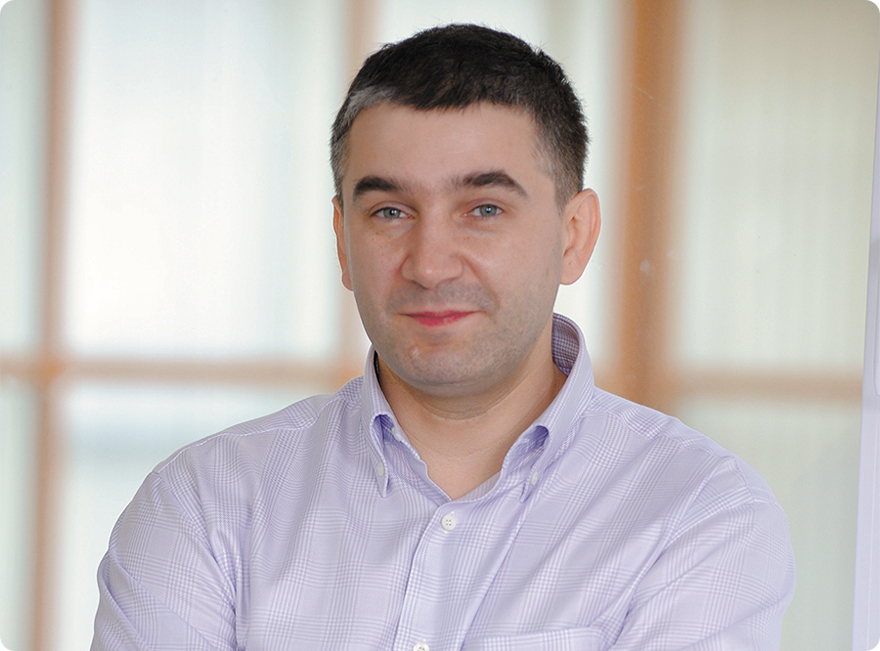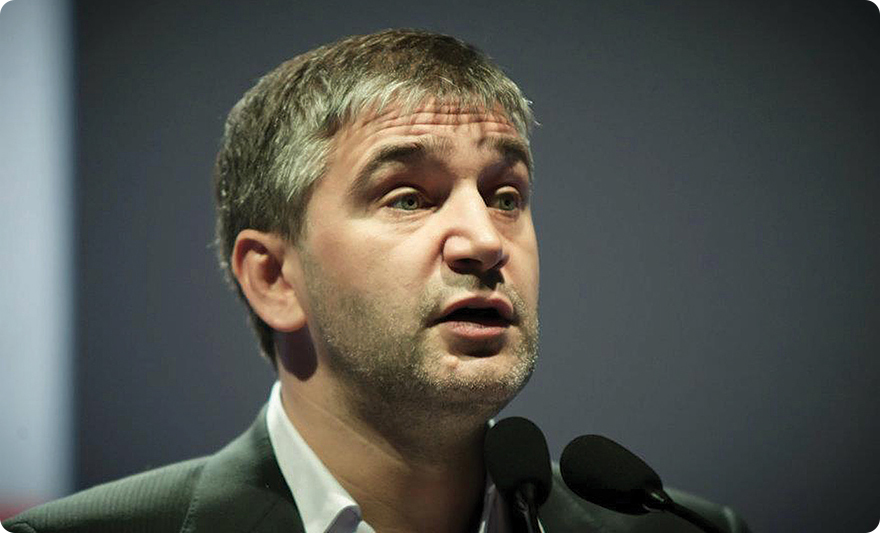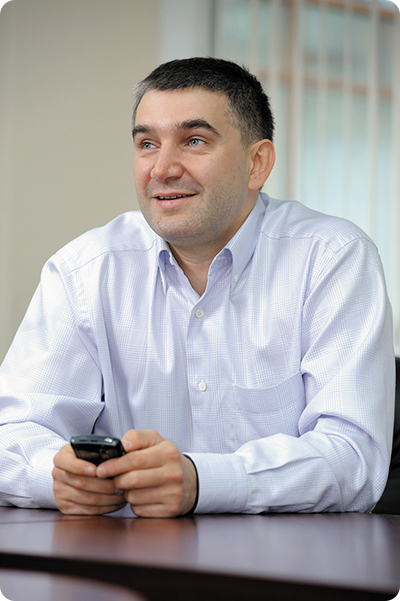Interview with Sergei Belousov: really big data

Interviewed: Stepan Ilyin
I met with Sergey Belousov at eight in the morning in a Moscow hotel. The concept of home is outdated for him: why do we need houses and apartments if there are hotels? Perhaps it was this sharp and out-of-the-box thinking that helped him build several technology companies in completely different areas: from the development of a Linux distribution (ASP Linux) and virtualization technologies (Parallels) to data storage and backup systems. At some point, the venture fund Runa Capital became the main activity, but now its focus has shifted to one of the long-established companies - Acronis.
Return to Acronis
For many years I have not done Acronis, but now I suddenly had to. Over the years, Acronis has changed management teams several times, but lately they have not done very well, and the company did not grow as fast as it could. So, in my opinion, the company can easily grow tenfold or more. So I decided to return to Acronis.
')
Any project has a certain intrinsic property, like human DNA. List of requirements, specifications, tasks. This arises from the context.
Data:
- Hard worker. Works an average of 85-100 hours per week.
- Investor He invested in several dozen projects, being a senior partner of the venture fund Runa Capital, including in nginx Igor Sysoev.
- Physicist. A complete set: a graduate of the Physics and Technology Department, a candidate of technical sciences, an honorary doctor of MIPT and a holder of more than two hundred patents
- Traveler. Since 2001, a citizen of Singapore, which is very convenient for traveling around the world on endless business trips: Singaporeans do not need visas in almost all countries of the world.
- Entrepreneur. He founded more than 20 companies, including Acumatica and SWSoft, which has become two world-famous companies - Parallels.
Context is the environment. For example, if we are settled on Mars with our DNA, we will live there for a few seconds, or even less. Because there is a different context.
Project management is like intelligence or central nervous system. If the intellect is all right, then you will not fly to Mars.

Acronis was not in its context, it could not function properly. In this situation, she started the management. Now the project must be returned from Mars to Earth. Nevertheless, it is still a stable and profitable company.
One of the parts of Acronis DNA has always been a fairly strong team. She stayed now, just a little “smeared”, but we almost collected her back. This is a group of people who are well versed in data storage systems. Now Acronis needs superfine technologies: ultra-fast, super-efficient, ultra-reliable.
Do you know what size the industry of Swiss watches reaches? 25 billion dollars. And Swiss watches always advertise on yachts, in space and so on. But you buy them and, of course, never drive a yacht with them in a storm and do not dive to a depth of 200 meters. But it's nice that you have this opportunity.
To make it real, Swiss engineers spend time and effort. If they claim that their watches are working at a depth of 200 meters or in space, this is true. Acronis has also always made this kind of technology. But now it is just one of those DNA components that has broken.
Break the DNA of the project manager can. The team that was in Acronis before did not set out to sharpen technology for complex tasks. If you continue the example with the clock, the manager may decide: “Oh, we are Casio, why do we need good technologies at all? After all, we sell cheap watches, let's save! We will buy bad displays, quartz oscillators, we will not worry about software, we will not add any properties there. What does it matter, what kind of cases will we have? ”That is, Casio is also a good watch, but these are not perfect technologies. We want to be a Swiss watch. Accordingly, we are now returning everything to its place.
Takeoff storage systems
The focus of innovation moves from time to time. Sometimes the focus shifts to web applications, sometimes it returns to platforms. Now this center has moved to storage systems. That is, a huge number of startups, new technologies, which are associated with the simple fact that the amount of data is growing rapidly.
We can not say that we have missed some trends. Software companies, like living beings, have such a property - a very high level of survivability, a large margin of safety. Let's say it’s not easy to kill a person. He is resilient, you need to torment him for a long time.

When Acronis started, we developed very good data storage technologies, but storage was not a trend. And now this is a very big trend. After all, the amount of data is growing infinitely fast. Personal data, backups, analytics - all this must be stored somewhere. In particular, it was therefore interesting for me to return to Acronis and work on this task.
The whole world that we know turns into data: they become incredibly valuable and important. I think it is only a matter of time when the value of the data that you generate on your computer over a lifetime will exceed your own value.
Singapore is going to make a sequencing of all its inhabitants. The population of the country, including expatriates,
about six million people. One sequenced DNA, even after optimization, takes 22 GB. Six million is some incredible amount of data: 6000 * 22 PB. The storage system for such data is a very complex system. And this is only in small Singapore. And sequentially in the end, obviously, every person in the world. And not only the people themselves, but still all their viruses and so on.
All storage systems have changed a lot. And Makovsky HFS, and Windows NTFS will soon cease to be relevant. Some time ago, file systems seemed to have stopped evolving altogether. And here again the trend begins to change.
Large amounts of data
Now we are launching Acronis Storage technology, which was previously used only in our own data centers. We developed it five years ago - and so far we have used it only within the company. Its main properties are very high reliability, scalability and efficiency.
Large amounts of data begin to show very strange effects. For example, cosmic particles, I'm not kidding. Every data system of some size has a cross section. From time to time particles arrive from space that can fall into bits. If they get to the very right place a bit, it can roll over. This happens quite rarely, but the more data you have, the more often it happens. On some systems this happens almost all the time. For example, if you have a million petabytes, then this is a permanent situation. The storage system must be resistant to this, it should not break. Therefore, another kind of reliability is required there.
Scalability is also very important. Even trying to find a block or file on a very large system can be a very expensive operation. Say, on a million petabyte system, the file table itself can be the size of a petabyte. And load it into memory to read, it is impossible. While there is no memory in petabyte volume. Such a table should be read in a fundamentally different way. And store too.
Acronis products are sold in more than 90 countries around the world and translated into 14 languages.
Efficiency is no less important. With so much data, even small changes in efficiency are of great value. For example, a storage system can cost a hundred million dollars. Then the change in its efficiency by 10% is a gain of ten million.
The level of errors in the storage system should be ten times less than in operating systems. The OS may crash, something may go wrong, but it's not scary - you can reboot, install an update. And if data is lost, everything is irrevocable. Therefore - a low level of errors and a high level of quality.
HR issues
Acronis can save its DNA and develop, only making super-quality technology. And only super-advanced people who fit in well with the team are capable of that. The degree of reliability should be very high, and only very high-quality programmers can develop such systems.
All developers and R & D are in Russia. We recently discussed with the division of Ernst & Young in Israel, which just specializes in auditing technology companies, are there any programmers in Russia and how many are there? But the whole idea is that you don’t need much. Only a few are needed - but of extremely high quality.
The company has offices in 18 countries, including the USA (Boston), Germany (Munich), Japan (Tokyo), France (Paris), Great Britain (London), Belgium (Brussels), and Singapore.
Of course, there are more programmers in India or China, but this is not the main thing - quality is important. Quality is key
value, for example, the same nginx was written by one person - Igor Sysoev. And Acronis core technology was written by five people, they are still developing it. We really need to find five more of the same. Russian-speaking population - more than 200 million people, including the CIS countries. Surely five people can somehow scrape together.
In Russia, we are looking for people who will be architects, product managers, program managers and mainly senior programmers. That is, people who will be doing complex pieces of code. Not from Russia, we attract people with business expertise. These are either managers of large teams, or those who understand well in the product or user experience (which are closer to the client).

If a person has decided to live in Russia, then there are few teams capable of giving him the opportunity to write software, which will be used by one hundred million people. On the fingers of two hands. Acronis is definitely one of the best teams, and now we are with Stanislav Protasov, senior vice president of research and development at Acronis, will make it the best team. It is more pleasant to write a storage system, which is used by hundreds of millions of people, than, for example, software to let even the largest bank.
Acronis currently employs about 650 people, almost half of whom are developers with experience in software giant companies.
About my role
I haven't been writing code for a long time, but I am directly involved in the development of complex technologies. It's like conducting an orchestra. When you conduct an orchestra ... do you know how to play any instrument well? You can, but you never play. The main task is to somehow conduct a complex orchestra in order to get a consistent signal. Basically this is what I do.
Someone must conduct. In the most successful companies it is always one person: at Microsoft it was Bill Gates, on Facebook - Mark Zuckerberg. Mark does not write code, but he conducts. Someone should take this role. It's like a brain transplant. Probably, if it was not me, someone else should have taken the place. But then it had to be his company. Since my company - I have to.
The other person will not have such a large amount of motivation and knowledge of details so that he can conduct the orchestra. Therefore, the technology has to climb. But it is precisely in complex technologies, only this is really interesting to me.
Trends
From my point of view, for the technical audience now there are five promising areas in complex technologies.
Large, massive storage systems. This is a powerful trend that many startups pick up. Many of those who previously developed the old platform, went into the development of storage systems. Yes, these are rather boring systems, but this is a very large area: there is a lot of data and they are gradually moving to the cloud. As I said, the focus of technology is moving. Now he has shifted again, because security has become important, different communication algorithms, reliability. Reliability is imposed on everything, even on data transfer. When a very large amount of data is transmitted, errors that are present in any protocol begin to emerge more strongly. If you have one hundred thousand users and 0.01% of your users are dissatisfied, then this is not a problem - it is only a hundred people. And if you have a hundred million users, and not a hundred thousand, then the disgruntled is no longer a hundred people, but a hundred thousand. Their concentration at any temporal and spatial point is large enough.
Big Data. Data storage systems and the Big Data area are connected, but not directly. If you store a lot of data, it is not necessary to carry out with them some kind of super-complex analytics. However, this is usually done.
Virtual worlds and systems for their creation. A huge number of people are increasingly living in the virtual space. Today’s systems for creating virtual worlds are games, interactive entertainment or learning systems, virtual worlds as such. But for now all this is handicraft. There are some platforms like Kinect, but they are not quite suitable for virtual worlds. They are all proprietary. It resembles the times before the Internet, when there was AOL, CompuServe, MSN - each vendor has its own platform. For a developer who wants to create his own virtual world, you need a lot of platforms and knowledge. This is not very convenient. The ideal way to create a virtual world is when you just sit and say: “I would like everything to be like in Moscow, but the houses were like in London, the air temperature is always 30 degrees, it would rain for two days ...” That is, if you can it would tell the script - and all this would appear. To date, this does not exist.
Robots Robots are a combination of hardware and software, but software matters most. In man, the main thing is also software. If the software in a person is turned off, he begins to be ... a corpse. It is necessary to develop platforms for various robotic systems. There will be a lot of them. The simplest example is automatic cars: soon all or many cars will be without drivers. This also includes any tracking systems, control systems. It is necessary to be able to conveniently program the "mind" of these systems, their behavior. Now there are many different systems, and they are rather unsuitable for real use. Therefore, developers use systems that are not written for this at all — platform, storage, OS, and so on. One of the problems of robots - communication with each other in real time. Now their communication systems are very slow, ineffective. If they are connected to each other, then everything is not bad. And if they are under water, where there is no Wi-Fi and the data transmission system pulls only 1 Kb / s? If you have a group of robots, it will be very difficult to ensure that they behave like a flock of fish. Pisces see each other, and the interface between them is not 1 Kb / s, but, say, 1 Mb / s.
Internet of things. Simply put, the internet is everything. A huge number of things now connects to the Internet. Usually, when people talk about the Internet of things, they think about some kind of fridges connected to the Network. But the Internet of things is not necessarily about that. It also includes alarm systems, data management systems, temperature control, as well as cars and robots that need to communicate with each other through some kind of network.
Acronis blog on Habré

First published in Hacker magazine dated 11/2013.
Publication on Issuu.com
Subscribe to "Hacker"


Source: https://habr.com/ru/post/212147/
All Articles